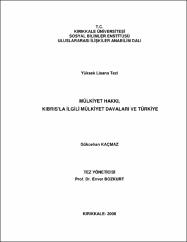Mülkiyet hakkı, Kıbrıs'la ilgili mülkiyet davaları ve Türkiye
Özet
Mülkiyet, insanla tabiat ve insanla insan arasındaki ilişkiyi kapsayan geniş bir kavramdır. Mülkiyet hakkı ise hakkın konusu olan eşya üzerinde kanunların belirlediği sınırlar dahilinde istenildiği gibi tasarruf etme yetkisidir. Bundan yola çıkarak, mülkiyet, hem ekonomik gerçekli hem de hukuki bir olaydır diyebilmek mümkündür. Tarihin en başından beri mülkiyet insanlığın en zor problemlerinden olmuştur. Yakın zamanda da Kıbrıs Sorununda mülkiyet meselesi Türkiye'nin çözmeye çalıştığı fakat bir türlü çözüme ulaşamayan problemi olmuştur. Kıbrıs sorunu Türk Dış Politikasının en önemli unsurlarından biridir. Bu sorunun kilit noktasını oluşturan mülkiyet meselesi, Türkiye'nin AİHM'nin bireysel başvuru hakkını tanımasıyla birlikte Türkiye aleyhine açılıp aynı şekilde sonuçlanan Loizidou ve Arestis davalarıyla birlikte zirveye çıkmıştır. BM Annan Planıyla Kıbrıs'taki mülkiyet sorununa çözüm önerisinde bulunmuş, yapılan oylama sonucunda Kıbrıslı Rumlar tarafından reddedilen plan sonrasında AB'ye GKRY üye olarak katılmıştır. Bu çalışmanın ana teması, Kıbrıs'taki mülkiyet davalarının, Türkiye'yi ve Türkiye'nin Kıbrıs politikasını ve nasıl etkilediği üzerinedir. Türkiye bu sorunun hallolması için çözüm arayışları içerisine girmiştir. Kıbrıs Sorunu konusunda güçlü devletlerin hiç birinden destek göremeyen Türkiye, bu sorunu kendi politikasıyla çözmeye çalışmıştır. Property is a comprehensive term which covers human to nature and human to human relationship. On the other hand, the right of property is the authority of using freely the good, which is the subject of the right, under the limitations of law. Then, it is possible to state that property has both economic and legal aspects. Since the very beginning of the history, property has been one of the most difficult concerns of humanity. The issue of property within the context of the Cyprus question has recently been a problem that could not be solved by Turkish rulers in spite of their sincere efforts. The Cyprus problem is one of the most important components of Turkish foreign policies. The issue of property, the key of the Cyprus problem, has reached to the peak levels with the Loizidou and Arestis cases, which emerged as a result of Turkey?s accepting the right of individual application to European Court of Human Rights and were concluded against Turkey. The United Nations suggested a solution to the property problem with the Annan plan, but after Greek Cypriots rejected the plan in the referendum, the Greek Administration of Southern Cyprus gained the European Union membership. This study is mainly focused on how the property cases in Cyprus have affected Turkey and its Cyprus policies. Turkey has always tried to find a solution to this problem. Since it has not been supported by the major powers in this effort, it has tried to solve the problem through its own policies.
















